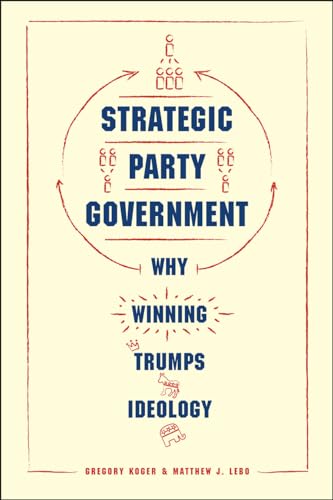Strategic Party Government: Why Winning Trumps Ideology (Chicago Studies in American Politics) - Softcover

Inhaltsangabe
Why is Congress mired in partisan polarization? The conventional answer is that members of Congress and their constituencies fundamentally disagree with one other along ideological lines. But Gregory Koger and Matthew J. Lebo uncover a more compelling reason that today’s political leaders devote so much time to conveying their party’s positions, even at the expense of basic government functions: Both parties want to win elections.
In Strategic Party Government, Koger and Lebo argue that Congress is now primarily a forum for partisan competition. In order to avoid losing, legislators unite behind strong party leaders, even when they do not fully agree with the policies their party is advocating. They do so in the belief that party leaders and voters will reward them for winning—or at least trying to win—these legislative contests. And as the parties present increasingly united fronts, partisan competition intensifies and pressure continues to mount for a strong party-building strategy—despite considerable disagreement within the parties.
By bringing this powerful but underappreciated force in American politics to the forefront, Koger and Lebo provide a new interpretation of the problems facing Congress that is certain to reset the agenda for legislative studies.
Die Inhaltsangabe kann sich auf eine andere Ausgabe dieses Titels beziehen.
Über die Autorin bzw. den Autor
Gregory Koger is associate professor of political science at the University of Miami. He is the author of Filibustering: A Political History of Obstruction in the House and Senate, also published by the University of Chicago Press. Matthew J. Lebo is professor of political science at Stony Brook University, where he also directs the Center for Behavioral Political Science.
„Über diesen Titel“ kann sich auf eine andere Ausgabe dieses Titels beziehen.
Weitere beliebte Ausgaben desselben Titels
Suchergebnisse für Strategic Party Government: Why Winning Trumps Ideology...
Strategic Party Government : Why Winning Trumps Ideology
Anbieter: Better World Books Ltd, Dunfermline, Vereinigtes Königreich
Zustand: Very Good. Reprint. Ships from the UK. Former library book; may include library markings. Used book that is in excellent condition. May show signs of wear or have minor defects. Artikel-Nr. 47036061-20
Gebraucht kaufen
Anzahl: 1 verfügbar
Strategic Party Government
Anbieter: PBShop.store US, Wood Dale, IL, USA
PAP. Zustand: New. New Book. Shipped from UK. Established seller since 2000. Artikel-Nr. FW-9780226424606
Strategic Party Government
Anbieter: PBShop.store UK, Fairford, GLOS, Vereinigtes Königreich
PAP. Zustand: New. New Book. Shipped from UK. Established seller since 2000. Artikel-Nr. FW-9780226424606
Neu kaufen
Anzahl: 15 verfügbar
Strategic Party Government: Why Winning Trumps Ideology (Chicago Studies in American Politics)
Anbieter: Majestic Books, Hounslow, Vereinigtes Königreich
Zustand: New. pp. 224. Artikel-Nr. 371460501
Neu kaufen
Anzahl: 3 verfügbar
Strategic Party Government Why Winning Trumps Ideology
Anbieter: Revaluation Books, Exeter, Vereinigtes Königreich
Paperback. Zustand: Brand New. reprint edition. 224 pages. 9.00x6.00x0.75 inches. In Stock. Artikel-Nr. __022642460X
Neu kaufen
Anzahl: 2 verfügbar
Strategic Party Government: Why Winning Trumps Ideology (Chicago Studies in American Politics)
Anbieter: Ria Christie Collections, Uxbridge, Vereinigtes Königreich
Zustand: New. In. Artikel-Nr. ria9780226424606_new
Neu kaufen
Anzahl: Mehr als 20 verfügbar
Strategic Party Government: Why Winning Trumps Ideology (Chicago Studies in American Politics)
Anbieter: Kennys Bookstore, Olney, MD, USA
Zustand: New. Series: Chicago Studies in American Politics. Num Pages: 224 pages. BIC Classification: 1KBB; JPHC. Category: (P) Professional & Vocational. Dimension: 153 x 229 x 17. Weight in Grams: 342. . 2017. Reprint. Paperback. . . . . Books ship from the US and Ireland. Artikel-Nr. V9780226424606
Neu kaufen
Anzahl: Mehr als 20 verfügbar
Strategic Party Government
Anbieter: moluna, Greven, Deutschland
Zustand: New. KlappentextrnrnWhy is Congress mired in partisan polarization? The conventional answer is that members of Congress and their constituencies fundamentally disagree with one other along ideological lines. But Gregory Koger and Matthew J. Lebo unco. Artikel-Nr. 594440836
Neu kaufen
Anzahl: Mehr als 20 verfügbar
Strategic Party Government : Why Winning Trumps Ideology
Anbieter: AHA-BUCH GmbH, Einbeck, Deutschland
Taschenbuch. Zustand: Neu. Neuware - Why is Congress mired in partisan polarization The conventional answer is that members of Congress and their constituencies fundamentally disagree with one other along ideological lines. But Gregory Koger and Matthew J. Lebo uncover a more compelling reason that today's political leaders devote so much time to conveying their party's positions, even at the expense of basic government functions: Both parties want to win elections. In Strategic Party Government, Koger and Lebo argue that Congress is now primarily a forum for partisan competition. In order to avoid losing, legislators unite behind strong party leaders, even when they do not fully agree with the policies their party is advocating. They do so in the belief that party leaders and voters will reward them for winning--or at least trying to win--these legislative contests. And as the parties present increasingly united fronts, partisan competition intensifies and pressure continues to mount for a strong party-building strategy--despite considerable disagreement within the parties. By bringing this powerful but underappreciated force in American politics to the forefront, Koger and Lebo provide a new interpretation of the problems facing Congress that is certain to reset the agenda for legislative studies. Artikel-Nr. 9780226424606
Neu kaufen
Anzahl: 1 verfügbar

